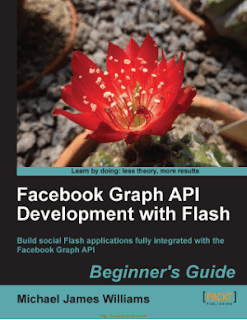Download
Introduction
Facebook is big, by all meanings of the word. It's used by half a billion people—and countless
businesses, bands, and public figures—for socializing and self-promotion. It's also a huge
development platform, with tens of thousands of applications.
It's now common to see a Facebook "Like" button on blog posts, news articles, and many
other websites. In the same way, Facebook integration is becoming more and more desirable
for browser-based RIAs and games, with some, like FarmVille, even being based entirely
around Facebook. That's where Flash comes in.
What this book covers
Chapter 1, Introduction, gets you up to speed with Facebook and ready to learn to develop
Flash applications that connect with the Facebook platform. You'll learn why it's worth
putting more time into developing for Facebook than other social networks (and why it's
likely to stay that way), and get yourself technically set up for coding.
Chapter 2, Welcome to the Graph, introduces you to Facebook's model for connecting all the
information in its huge data stores—the Graph API. You'll discover how intuitive this model
is, and will start to explore the publicly available data using AS3 through utility code, which
you'll build from scratch.
Chapter 3, Let Me In!, breaks down Facebook's systems for security, permissions, and
authentication. You'll learn how to access the private data of Facebook users (including their
photos, biographical information, and lists of friends). You will also start using the official
Adobe ActionScript 3 SDK for Facebook platform alongside your own utility code.
Chapter 4, Digging Deeper into the Graph, helps you understand the concepts of paging
and filtering, so that you aren't restricted to using only the default dataset that Facebook
presents you with. You'll find out how to obtain data from specified dates, and how to speed
up your applications by retrieving information from multiple sources at once
Chapter 5, Search Me, builds on the previous chapter by teaching you how to search for data
based on criteria other than dates. You'll learn how to retrieve Wall Posts by specific users,
pages with specific names, and places by specific geographical coordinates.
Chapter 6, Adding to the Graph, takes you beyond merely retrieving data and into publishing
new data to Facebook. You'll find out how to create new Wall Posts (including rich posts
including images and embedded hyperlinks); how to comment on other users' Wall Posts; how
to create new events, notes, and albums; and how to upload photos from your hard drive.
Chapter 7, FQL Matters, takes a break from the Graph API to teach you how to learn a
powerful search tool—Facebook Query Language. You'll trade the Graph API's intuitiveness
and simplicity for FQL's depth and additional features, while also understanding the benefits
that each approach offers over the other.
Chapter 8, Finishing Off, wraps up what you've learned throughout the book and gets
you ready to release your application to the wild. You'll find out how to embed your
application into the Facebook website itself; how to get it into the official Facebook
Application Directory; and how to export it as a desktop or Android application, while
still keeping its Facebook connectivity. Finally, you'll learn how to keep up-to-date with
the ever-changing Facebook platform, and discover some useful resources for taking what
you've learned even further
What you need for this book
To develop and compile the example code in this book, you will need an AS3 compiler.
Sample projects are provided for use with Flash Professional (CS3 and above), Flash Builder,
and the free FlashDevelop IDE (with the Flex SDK); if you use a different workflow you will be
able to convert these to fit your tools.
You'll also need previous experience with AS3 class-based coding and a Facebook
account. The exact requirements here, along with what to do if you don't meet them,
are detailed in Chapter 1.
Who this book is for
If you are an AS3 developer who wants to create applications and games that integrate with
Facebook—either on the Facebook website itself or off it, then this book is for you. Even if
you have no previous experience with Facebook, databases, or server-side programming, you
can follow this book.

